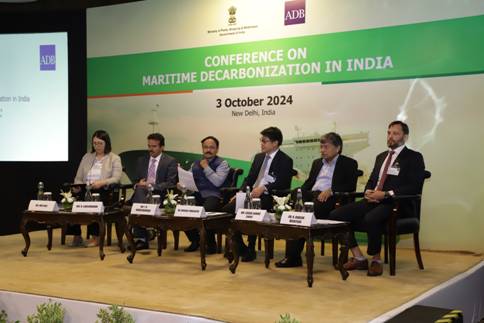New Delhi: The Conference on Maritime Decarbonization in India, co-hosted by the Ministry of Ports, Shipping & Waterways (MoPSW) and the Asian Development Bank (ADB), concluded today at Le Meridien, New Delhi. The event brought together over 200 delegates, including leaders from key Indian ports, government officials, industry stakeholders, international experts, and academia to discuss strategies for green shipping and sustainable port operations.
The conference marked an important step in India’s commitment to achieving net-zero carbon emissions by 2070. Discussions centered around the decarbonization of the maritime sector, aligning with the Maritime India Vision 2030. Key themes included green port infrastructure, the adoption of zero-carbon fuels, emissions reduction strategies, and the electrification of inland waterways.
In his keynote address, T.K. Ramachandran, Secretary of MoPSW, emphasized India’s role in leading global efforts to combat climate change through maritime decarbonization. “India’s maritime sector is not just a key driver of the nation’s economy but also a critical player in our fight against climate change. Through initiatives like the Harit Sagar Green Port Guidelines and Harit Nauka Green Transition Guidelines, MoPSW is setting a global example,” he stated. He further outlined MoPSW’s ambitious plan to convert all vessels in Indian waters into green vessels by 2047, as part of a broader climate action strategy.
The conference highlighted the National Green Hydrogen Mission as a pivotal component in reducing carbon emissions. MoPSW’s efforts to align the maritime sector with these goals were underscored through presentations on green energy adoption and sustainable practices, setting the stage for India’s long-term vision of balancing economic growth with environmental responsibility.
One of the key sessions, Green Ports and Maritime Decarbonization, featured experts sharing best practices for reducing the carbon footprint of ports. Ajay Kumar Singh, Head of DNV Maritime Advisory India, discussed the role of smart ports in enhancing energy efficiency, while Lawrence Ong from the Maritime and Port Authority of Singapore provided insights from Singapore’s decarbonization efforts.
Another session explored the adoption of zero-carbon fuels, such as green hydrogen and ammonia. Captain Prashant S. Widge of Maersk Line offered a global shipowner’s perspective on the challenges of transitioning to green fuels, while Madhu Nair, CMD of Cochin Shipyard, highlighted India’s experience with alternative fuels.
Inland waterways were also spotlighted as a key area for decarbonization, with presentations from R. Lakshmanan, Joint Secretary (IWT), MoPSW, and P.J. Shaji, CGM of Kochi Water Metro. They showcased the sector’s progress in reducing emissions, with a focus on the adoption of low-emission alternative fuels to fully realize the potential of inland water transport as a sustainable mode.
The conference concluded with a panel discussion moderated by Dr. Yesim Elhan-Kayalar from ADB, focusing on India’s maritime decarbonization priorities and the next steps in green shipping practices. The event emphasized the need for ongoing collaboration between government bodies, industry leaders, and international organizations to achieve shared decarbonization goals.





